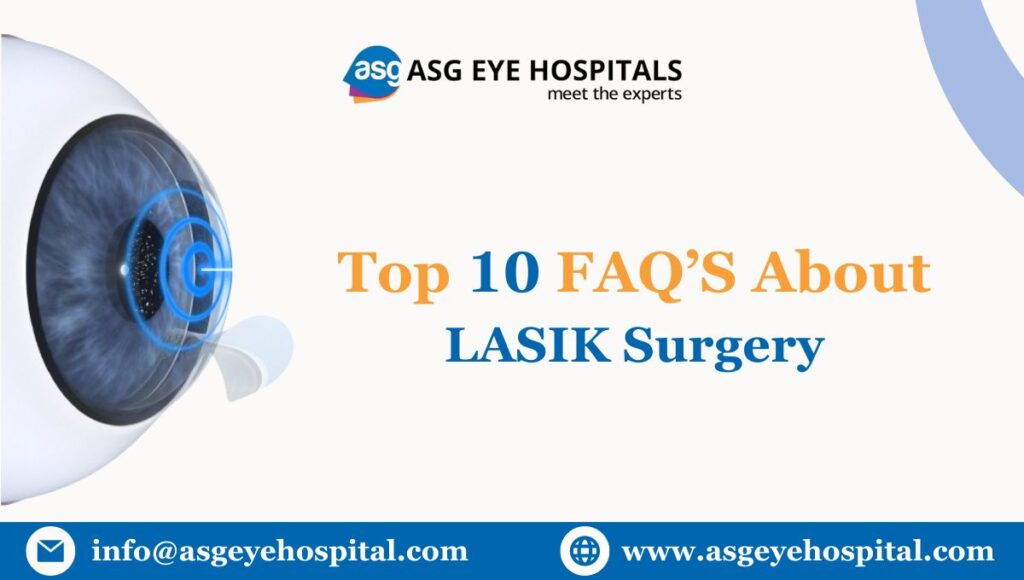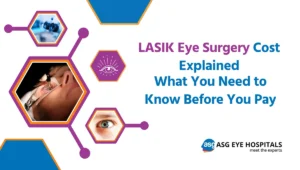LASIK (Laser-Assisted In Situ Keratomileusis) is the most common way of correcting refractive errors. Before we talk about LASIK surgery, let’s first understand the basics of our eye structure. Refractive errors like nearsightedness, farsightedness, and astigmatism occur due to complications in the lens or cornea. The lens is a flexible tissue in the middle of our eyes that focuses light rays onto the retina (present at the back of our eyes, detects light and transfers it to the brain). Explore the FAQ about LASIK Eye Surgery in this informative blog.
The lens helps focus the light rays by a process called accommodation (the process by which ciliary muscles function and alter the eye’s focal length so that the image forms on the retina). At a young age, we have a lot of accommodations that time lens lenses do not play much role in our prescription. But, at 40-50 years of age, our accommodation will start to decrease, and we require glasses for reading and doing activities.
LASIK surgery altered the irregularities of the cornea, which is mainly involved in our glass’s prescription. The cornea has five layers:
- The epithelium- outermost layer
- Bowman’s layer
- The stroma
- Descemet’s membrane
- The endothelium- innermost layer
The layer targeted by LASIK is Stroma, the thickest layer.
LASIK surgery is an effective solution for individuals who want freedom from glasses or contact lenses. However, many people still have concerns and questions about the LASIK surgery process. Here, we will address your concerns about LASIK Surgery and help you make the right decision.
Some FAQ about LASIK Eye Surgery are:
1. How does LASIK surgery work?
First, an eye doctor numbs your eyes with a topical anesthetic. After that, a small cut is created through the epithelium and Bowman’s layer of the cornea to reveal the thickest layer, stroma.
If you have myopia (nearsightedness) – the laser will cut off the central part of the stroma, it flattens the cornea.
If you have hyperopia (farsightedness) – the laser will cut off the peripheral part of the stroma, and it steepens the cornea.
If you have astigmatism – the laser will cut off the parts of the stroma depending on the meridian strength. So that light refracts on one point of the cornea rather than multiple points.
After reshaping the stroma, both upper layers of the cornea – Epithelium and Bowman’s layer, will be carefully pulled back and allowed to heal.
2. Is LASIK surgery safe?
LASIK is considered a safe and effective procedure for the majority of patients. However, like any surgery, it is not without risks. Potential complications are rare, and technological advancement has significantly reduced side effects. It is crucial to consult with a qualified and experienced eye surgeon to assess your candidacy and discuss any potential risks.
3. Who is a good candidate for LASIK?
Everyone is not an ideal candidate for LASIK. An ophthalmologist evaluates your overall health, eye health, and prescription stability to determine whether you are a good candidate for LASIK. Generally, individuals with stable prescriptions, good overall health, and realistic expectations are good candidates.
4. Is LASIK surgery painful?
LASIK is a relatively painless procedure. Numbing eye drops ensure you don’t feel any discomfort during the surgery. Some patients may experience minor discomfort or a gritty sensation in their eyes after the procedure, but this typically subsides within a day or two.
5. How much time does LASIK surgery take?
The LASIK procedure is quick, usually taking 15 minutes for both eyes. However, you may spend a few hours at the surgical center for pre-operative preparations and post-operative monitoring.
6. Can Both Eyes be Treated in the Same Session?
Yes, LASIK surgery will be performed on both eyes in the same session. Treating both eyes in the same session allows for a more balanced visual outcome. However, your surgeon will provide personalized recommendations based on your circumstances.
7. Is LASIK a Permanent Treatment?
LASIK is considered a permanent vision correction procedure. However, it does not prevent age-related changes in the eyes, such as presbyopia. While the procedure can last a lifetime, some individuals may require additional enhancements or adjustments over the years.
8. Will I Still Need Glasses After LASIK Surgery?
LASIK surgery can help improve distance vision but may not address the age-related decline in near vision, called presbyopia. There are options available to tackle presbyopia, such as monovision, where one eye will treated for distance vision and the other for close-up vision. Talk to your surgeon about which option is best for you.
9. Can LASIK Surgery Correct Astigmatism?
Yes, LASIK corrects astigmatism by reshaping the cornea to create a more uniform surface. Advanced LASIK technologies, such as wave front-guided or topography-guided treatments, can enhance the precision of astigmatism correction.
10. What is the Recovery Period of LASIK Eye Surgery?
Most patients experience improved vision immediately after LASIK, but it may take a day or two for optimal results to become apparent. It’s essential to follow post-operative care instructions provided by your surgeon, including avoiding strenuous activities and protecting your eyes from bright lights. Within a week, you will fully recovered.
LASIK surgery has provided millions of people with clearer vision and reduced dependence on glasses and contact lenses. While it’s essential to have realistic expectations and be aware of potential risks, LASIK has proven to be a safe and transformative option for many individuals. If you’re considering LASIK surgery, consult a qualified eye care specialist to determine your eligibility and discuss. Remember, informed decisions lead to successful outcomes, and LASIK could be the key to a clear and sharper vision.


